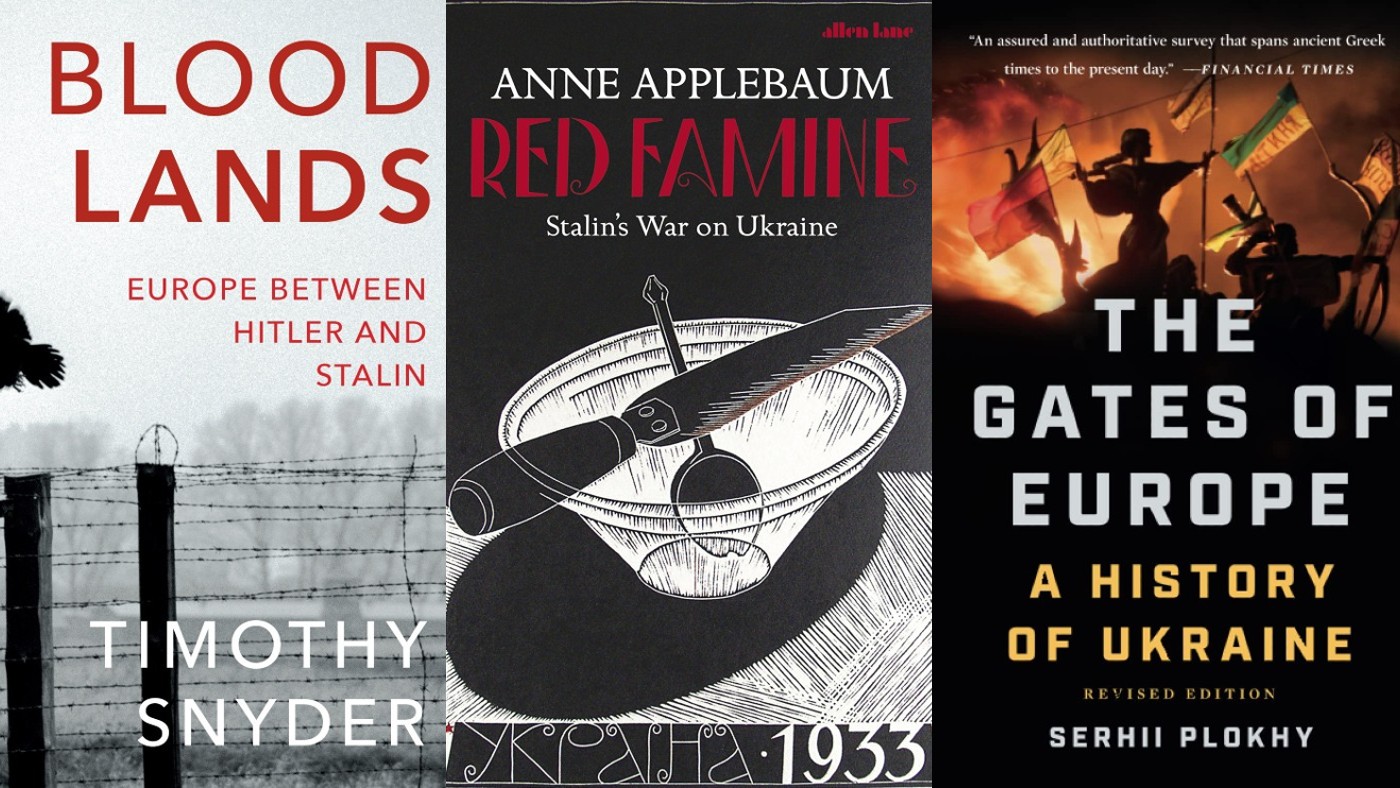War in Ukraine: the best books about the conflict’s background
The essential reading list to understand the history behind the war

A free daily email with the biggest news stories of the day – and the best features from TheWeek.com
You are now subscribed
Your newsletter sign-up was successful
“The first book on anyone’s reading list should be Timothy Snyder’s Bloodlands: Europe Between Hitler and Stalin,” said Edward Lucas in The Times. An exploration of Nazi and Soviet atrocities in the “bloodlands” of Poland, Ukraine and Belarus during the 1930s and 1940s, it’s the “best rebuttal to Putin’s Soviet-centred, cod-imperialist approach to the past”, displayed in his speeches and the “rambling essay” he published last year. Complementing it is Anne Applebaum’s Red Famine: Stalin’s War in Ukraine, an account of Stalin’s mass-starvation programme in Ukraine. “Only by understanding Ukraine’s historical trauma at Russian hands can Western readers begin to appreciate the depth of the country’s desire for peace and sovereignty.” For a fuller account of Ukraine’s history, Serhii Plokhy’s The Gates of Europe: A History of Ukraine is “masterly”. It explains why the “flawed” belief that Ukraine isn’t a real nation is so important to Russian nationalists.
Even so, it’s important to remember that Russia and Ukraine do “share much of their history”, said Orlando Figes in The Observer. Simon Franklin and Jonathan Shepard’s The Emergence of Rus 750-1200 is a scholarly guide to their common origins, in the “loose medieval state founded by the Vikings on the river routes between the Baltic and the Black Sea”. A number of fiction writers have also explored the two countries’ “shared culture”, said Oliver Bullough in The Guardian. To my mind, none have done so more successfully than Nikolai Gogol, especially in his short stories. “Raised in Ukraine, discovered in Russia, adored in both, Gogol conjures up the absurdity of life under autocracy better than anyone.” To understand Russia’s current autocracy, though, the “essential book” is Catherine Belton’s Putin’s People. It tells the inside story of how Putin “built a nuclear-armed mafia state”.
As the current conflict is reminding us, urban warfare can be “uniquely brutalising”, said Saul David in The Times. The siege tactics used by the Russians have even led to suggestions that Ukraine could witness a “new Stalingrad”. To understand those words, “read Antony Beevor’s Stalingrad, the classic account of Hitler’s failed attempt to capture the city on the Volga in the Second World War, which resulted in two million deaths”. Another conflict with echoes today is Russia’s second war against Chechnya, fought from 1999 to 2009. “Two excellent eye-witness accounts” of the “ruthless tactics” used by Putin, which reduced Grozny, Chechnya’s capital, to rubble, are Thomas Goltz’s Chechnya Diary and A Dirty War by the journalist Anna Politkovskaya, who was murdered in Moscow in 2006.
The Week
Escape your echo chamber. Get the facts behind the news, plus analysis from multiple perspectives.

Sign up for The Week's Free Newsletters
From our morning news briefing to a weekly Good News Newsletter, get the best of The Week delivered directly to your inbox.
From our morning news briefing to a weekly Good News Newsletter, get the best of The Week delivered directly to your inbox.
A free daily email with the biggest news stories of the day – and the best features from TheWeek.com
-
 James Van Der Beek obituary: fresh-faced Dawson’s Creek star
James Van Der Beek obituary: fresh-faced Dawson’s Creek starIn The Spotlight Van Der Beek fronted one of the most successful teen dramas of the 90s – but his Dawson fame proved a double-edged sword
-
 Is Andrew’s arrest the end for the monarchy?
Is Andrew’s arrest the end for the monarchy?Today's Big Question The King has distanced the Royal Family from his disgraced brother but a ‘fit of revolutionary disgust’ could still wipe them out
-
 Quiz of The Week: 14 – 20 February
Quiz of The Week: 14 – 20 FebruaryQuiz Have you been paying attention to The Week’s news?
-
 James Van Der Beek obituary: fresh-faced Dawson’s Creek star
James Van Der Beek obituary: fresh-faced Dawson’s Creek starIn The Spotlight Van Der Beek fronted one of the most successful teen dramas of the 90s – but his Dawson fame proved a double-edged sword
-
 Properties of the week: pretty thatched cottages
Properties of the week: pretty thatched cottagesThe Week Recommends Featuring homes in West Sussex, Dorset and Suffolk
-
 Kia EV4: a ‘terrifically comfy’ electric car
Kia EV4: a ‘terrifically comfy’ electric carThe Week Recommends The family-friendly vehicle has ‘plush seats’ and generous space
-
 Bonfire of the Murdochs: an ‘utterly gripping’ book
Bonfire of the Murdochs: an ‘utterly gripping’ bookThe Week Recommends Gabriel Sherman examines Rupert Murdoch’s ‘war of succession’ over his media empire
-
 Gwen John: Strange Beauties – a ‘superb’ retrospective
Gwen John: Strange Beauties – a ‘superb’ retrospectiveThe Week Recommends ‘Daunting’ show at the National Museum Cardiff plunges viewers into the Welsh artist’s ‘spiritual, austere existence’
-
 Bad Bunny’s Super Bowl: A win for unity
Bad Bunny’s Super Bowl: A win for unityFeature The global superstar's halftime show was a celebration for everyone to enjoy
-
 Book reviews: ‘Bonfire of the Murdochs’ and ‘The Typewriter and the Guillotine’
Book reviews: ‘Bonfire of the Murdochs’ and ‘The Typewriter and the Guillotine’Feature New insights into the Murdoch family’s turmoil and a renowned journalist’s time in pre-World War II Paris
-
 6 exquisite homes with vast acreage
6 exquisite homes with vast acreageFeature Featuring an off-the-grid contemporary home in New Mexico and lakefront farmhouse in Massachusetts